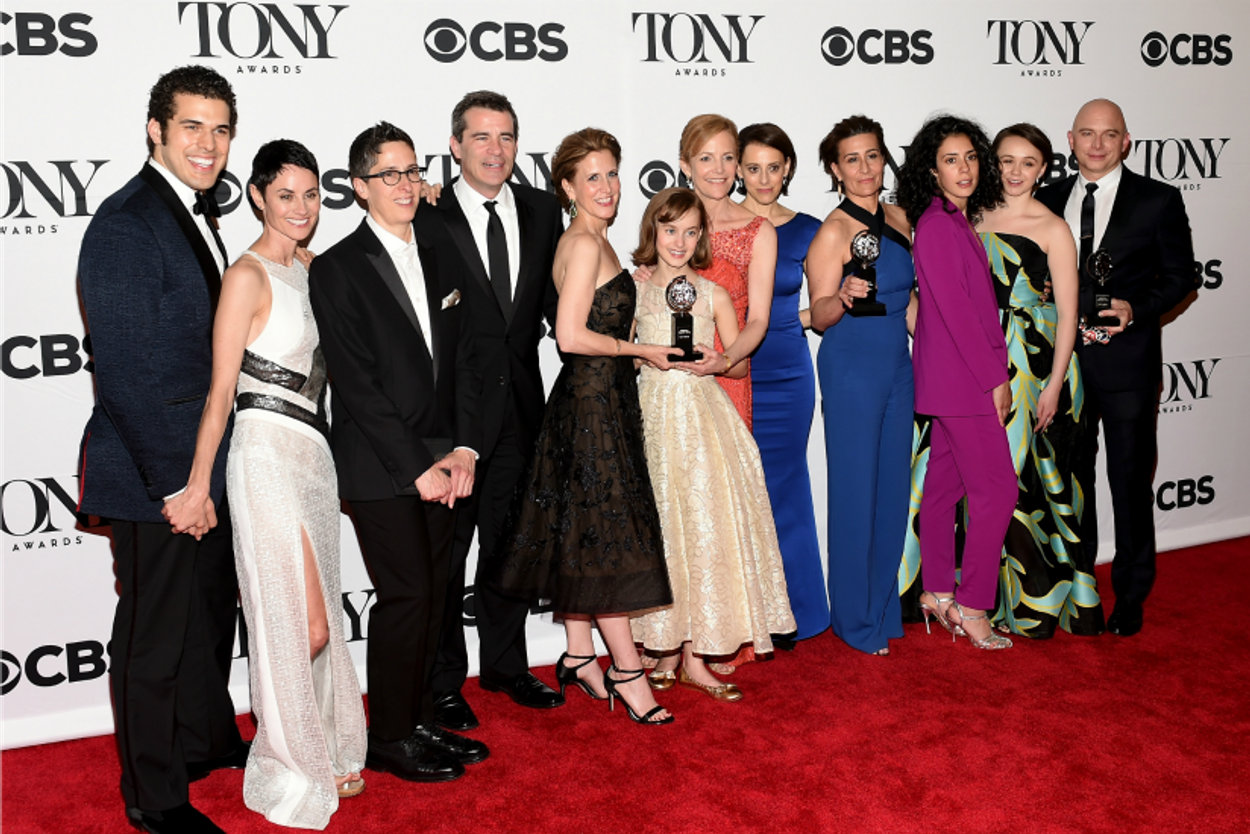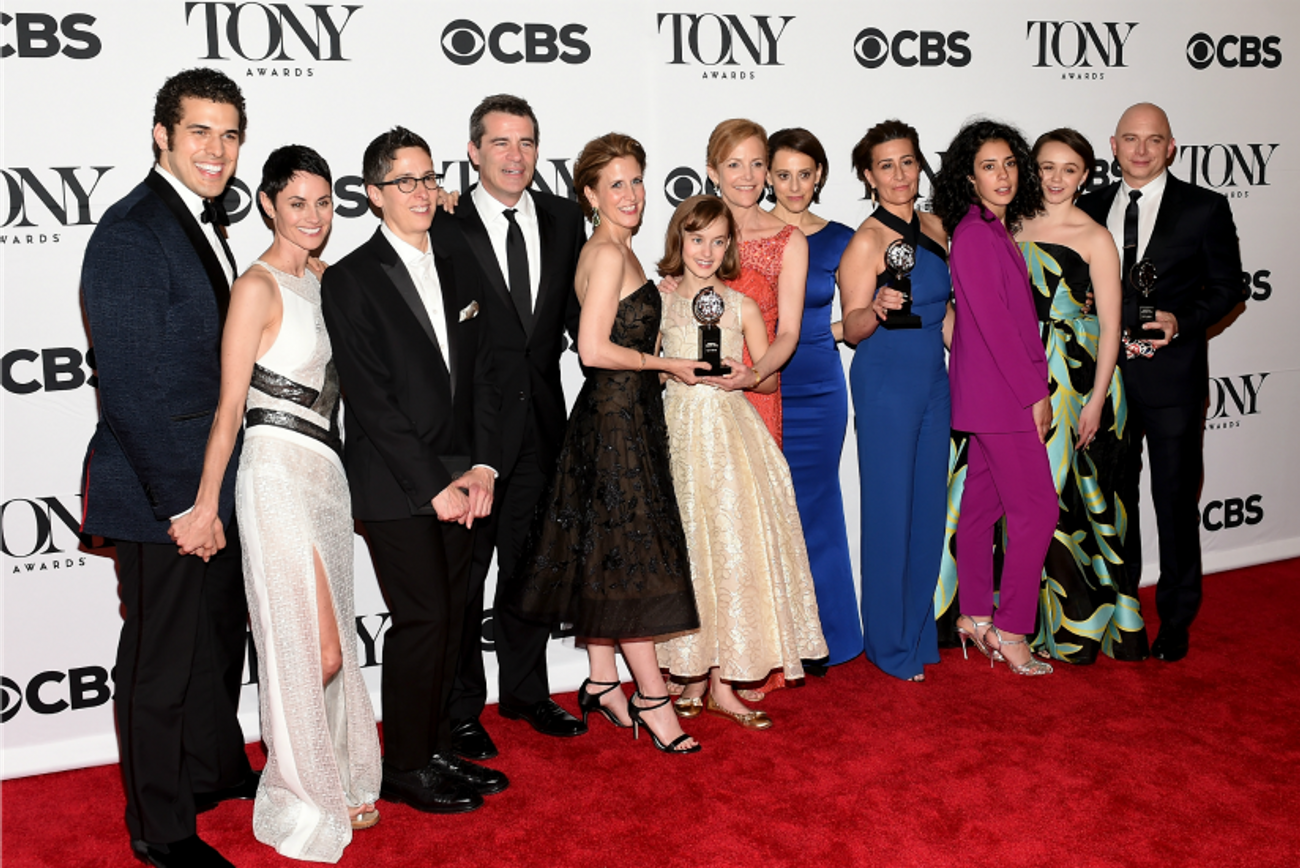Tony Awards Recap!
‘Fun Home’ won Best Musical, but the night was a mixed bag for Jewish nominees—and tribal humor




The 69th annual Tony Awards took place last night, and the fate of the Jews was mixed, with a good showing in awards for musicals, but dismal results for “straight plays.”
Bad news first: For plays, the vast majority of the awards went to British gentiles or their works, especially English import The Curious Incident of the Dog in the Night Time, which won five awards, including Best Play. Despite high hopes, its main competition Hand to God, lost all five of its nominations, including Best Play for writer Robert Askins, also of the Jewish Plays Project. Perhaps voters were not ready for a play about an evil hand puppet that torments participants in a Christian puppet ministry. Same for Wendy Wasserstein’s The Heidi Chronicles and Kenneth Lonergan’s This is Our Youth, which both lost their sole nominations (Best Actress in a Play and Best Play Revival, respectively). Kaufman and Hart’s You Can’t Take It With You managed to snag one Tony Award, however, as Annaleigh Ashford was won for Featured Actress in a Play—but that was as Semitic as the non-musical portion of the evening went.
But here’s the good news: The Chosen People were killing it for musical theatre. Most notably Fun Home, which delivered on the hype by taking home five awards, including Best Musical; self-described “neurotic New York Jew” Sam Gold won for Best Direction of a Musical on his first nomination; and playwright Lisa Kron, who is the daughter of a Holocaust survivor, won one award each for the show’s book and lyrics. Kron shared the Tony for musical score with composer Jeanine Tesori, who is also Jewish, according to Stewart F. Lane’s Jews on Broadway: An Historical Survey of Performers, Playwrights, Composers, Lyricists and Producers. In any case, the women made history as the first all-female songwriting team to win Best Score. Well done!
Father and daughter Joel and Jennifer Grey introduced Fun Home at the telecast, and it was a loving, funny moment between the Jewish actors. Fun Home is, in part, about a woman realizing her father is gay, and the presenter choice was almost certainly deliberate, as the elder Grey came out earlier this year.
Moving beyond Fun Home (albeit reluctantly—what a show!), neither revival of On the Town or On the Twentieth Century by Jewish songwriting team Comden and Green snagged any trophies. (The music for On the Twentieth Century also involved Jewish composer Cy Coleman.) And nothing for the rework of Lerner and Loewe’s Gigi either. Also no Tonys for Best Musical-contender The Visit, including Jewish songwriting team John Kander and the late Fred Ebb (and one of its losing producers was a Bronfman—Edgar Jr.).
However, a couple of other late Jewish duos fared better: The new incarnation of George and Ira Gershwin’s An American in Paris, set just after WWII, took home four technical awards. And the revival of Rodger and Hammerstein’s The King and I nabbed four Tony awards, including Best Featured Actress for Asian-American performer Ruthie Ann Miles. (This year’s Tony Awards were almost embarrassingly white). The production’s director, Bartlett Sher, will direct the upcoming Broadway revival of Fiddler on the Roof, so hopefully he can work his magic again later this year.
But what about the evening’s jokes, an art form associated so closely with the Tribe? Well, the Jewish jokes were not up to par. Since David Hyde Pierce couldn’t seem to find a positive quote about critics for his Broadway directorial debut, It Shoulda Been You, he read an email from a grateful audience member, noting that she related to the character with the overbearing Jewish mother. “Oy,” she wrote to him. It’s nice that the show’s use of lazy ethnic stereotypes went appreciated by someone.
Then, at the end of the night, Jason Alexander and Larry David presented the evening’s final award (and plugged Alexander as David’s replacement in Fish in the Dark). After bickering in character over Alexander’s tendency and ability to play incarnations of David, the latter announced that he wasn’t nominated because of anti-Semitism. He reached out to Harvey Weinstein to commiserate, since the producer’s Finding Neverland was also completely shut out of nominations.
While the gag was just David playing to (stereo)type, it was a particularly unfortunate joke for a night in which Jewish theatre artists and shows had some real achievements. And besides: A messy, melodramatic, embarrassing Finding Neverland performance made it abundantly clear that anti-Semitism wasn’t behind the show getting no nominations, despite David’s jokes.
That’s OK. The writing and directing of three Jewish artists—Gold, Kron, and Tesori—led to one of the best performances on the Tonys in years, during which a wide-eyed Sydney Lucas tried to figure out why seeing a woman in masculine dress makes her feel a way she can’t quite describe in Fun Home‘s “Ring of Keys.” It was pure Tony, and pure theatre magic.
Previous: The Tony Nominations Are Out!
Gabriela Geselowitz is a writer and the former editor of Jewcy.com.